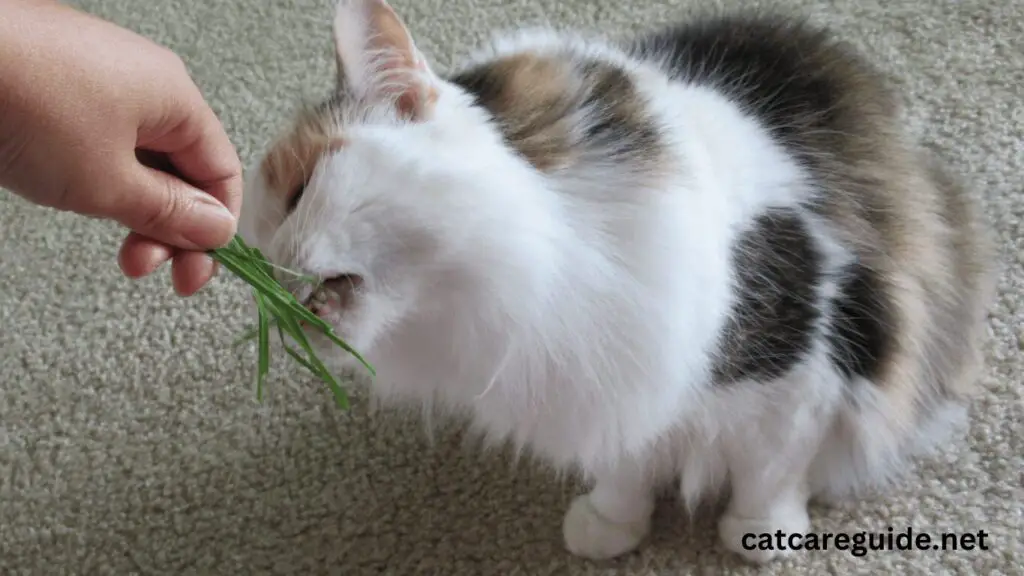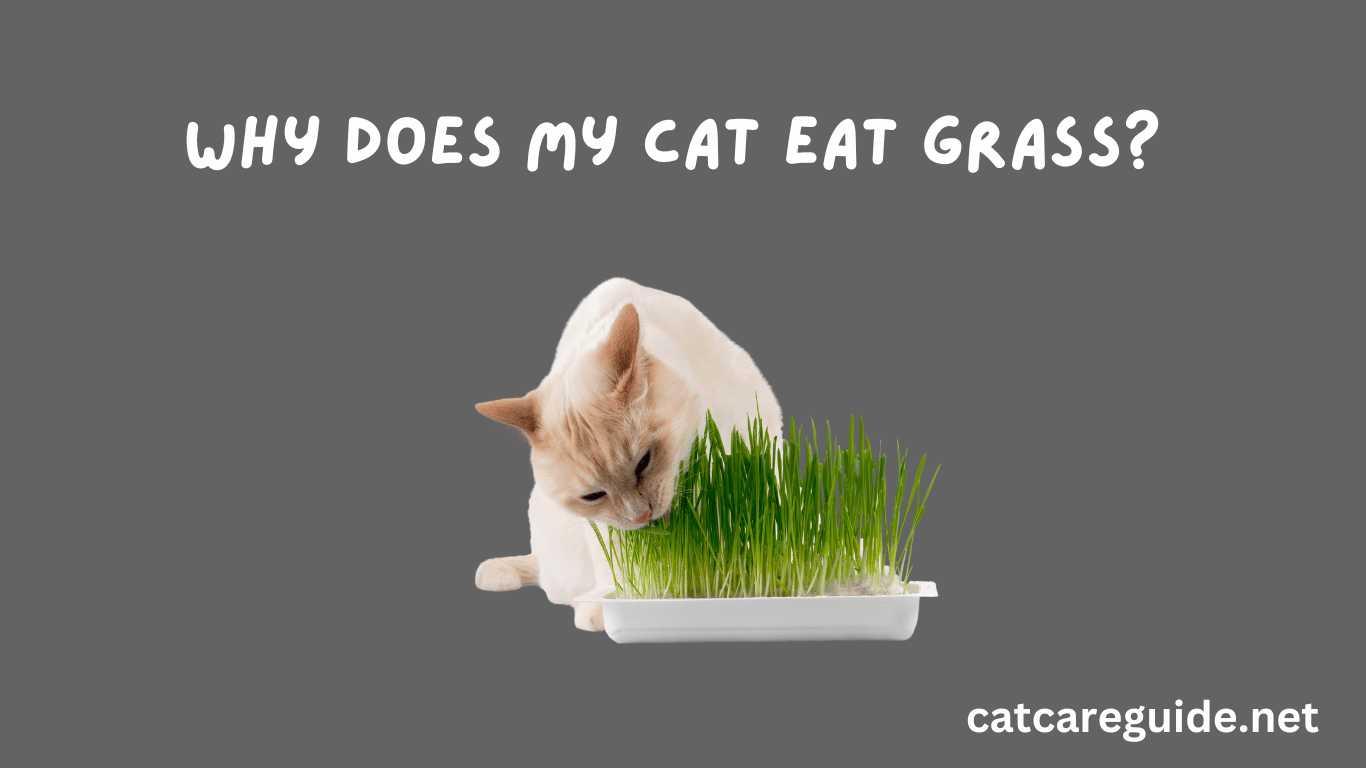Why Does My Cat Eat Grass? The Complete Guide for Concerned Cat Parents
Have you ever caught your cat happily munching away at blades of grass in your backyard or houseplants? You’re not alone. Many cat owners witness this strange behavior and wonder why cats eat grass and if it’s safe.
Rest assured that not only is eating grass completely normal for cats, but it can also be beneficial for their health. This comprehensive guide will walk you through everything you need to know about this peculiar feline behavior.
Is It Normal for Cats to Eat Grass?
Eating plants like grass or houseplants is an instinctual behavior passed down from your cat’s wild ancestors.
In the wild, cats don’t eat just meat from the animals they hunt. They also digest the stomach contents of their prey, which includes nuts, seeds, and—you guessed it—grass!
Domestic cats inherited this natural behavior of occasionally munching on greens. So rest assured that your cat eating grass is not a cause for alarm or a sign of nutritional deficiency. It’s just an innate tendency.
Now let’s explore why exactly cats feel compelled to snack on greens and what benefits it offers them when they do.
5 Reasons Why Cats Eat Grass
There are a few theories on why cats eat grass. Here are the top 5 explanations:
1. To Aid Digestion
One of the most common assumptions is that cats eat grass to help their digestion and pass hairballs.
The fibrous plant matter may act as a natural laxative, helping move things along in your cat’s digestive tract. This also speeds up the expulsion of hairballs and cleans out their system.
Many cat owners notice their kitty throwing up shortly after eating grass, which lends credibility to the digestion and hairball theory.
2. To Get More Folic Acid and Dietary Fiber
In the wild, cats eat the entire animal they hunt—fur, bones, and stomach contents included. This balances their diet with nutrients like folic acid that support red blood cell health and fiber for digestion.
When domestic cats snack on greens, they gain more folic acid and fiber, similar to their ancestral diet. This supplements what they get from processed cat food.
3. To Vomit as a Protective Mechanism
Some veterinarians postulate that eating plants allows cats to purge toxins, parasites, or other irritants from their stomach when they throw up.
This protective vomiting gives cats relief from nausea or stomach aches. It also expels unhealthy substances faster than the body can digest them.
4. Out of Instinctual Behavior and Like for the Taste
Scientists theorize that the grass eating behavior arises from cats’ ancestral origins. Wild felines naturally forage on grasses, plants and, occasionally, the stomach contents of their prey.
So chomping on greens may simply appeal to your cat’s primal instincts and taste preferences that developed over thousands of years.
5. To Cure Nausea or Stomach Aches
Some researchers believe cats learn to self-medicate by eating grass. The greens may trigger vomiting, but cats also seem to seek out grass when they’re already feeling nauseous.
The fiber and folic acid in the grass may relieve their upset stomach. So in a way, cats are naturally “dosing” themselves by eating grass therapeutically.
Now that you know why Fluffy may be grazing on grass, what does the science say about the benefits and risks of this behavior?
4 Potential Benefits of Cats Eating Grass
Many cat owners first seeing their kitty nibbling grass understandably worry it could make them sick.
However, not only is eating grass relatively safe for cats, but it can also benefit their health in the following ways:
1. Aids Healthy Digestion
As a source of fiber, grass helps stimulate the digestive tract in cats. This assists the body’s natural elimination of hair, bones and other byproducts that can cause vomiting or constipation.
The greens may also supply digestive enzymes and probiotic bacteria to support a healthy gut.
2. Provides Nutrients Like Folic Acid
In addition to fiber for digestion, grass delivers beneficial nutrients like folic acid, zinc, vitamin K and E, and potassium to supplement your cat’s diet. So it acts as a multivitamin!
3. Triggers Vomiting of Hairballs or Toxins
While throwing up isn’t pleasant, getting rid of hairballs, parasites or toxic substances lodged in your cat’s stomach protects their health. Eating grass gives their body the “green light” to purge the bad stuff out.
4. Satisfies Cravings to Chew on Plants
Given eating plants is an innate behavior for cats tracing back thousands of years, chomping on grass likely provides mental enrichment by satisfying these ancestral cravings.
Chewing grass may simply make cats happy by indulging their instincts!
Now that you know the four main benefits of cats eating grass, what are the potential downsides to watch out for?
Is Eating Grass Dangerous for Cats? 4 Key Risks
Eating grass itself is not inherently dangerous for cats. However, there are some hazards to keep in mind:
1. Pesticide Poisoning
Cats can get very ill by ingesting toxic pesticides, fertilizers, or herbicides from treated grass or plants. So it’s critical to grow organic cat grass free of chemicals. Thoroughly wash store-bought grass before feeding.
2. Upset Stomach or Vomiting if They Overeat
Gobbling down too much plant matter at once may cause gastrointestinal upset, vomiting, or diarrhea. Most cats know to only take a few bites of grass at a time. But some do overindulge.
3. Accidentally Eating Toxic Plants Instead of Grass
Cats often struggle to differentiate between safe, edible greens and toxic houseplants. Supervise your pet anytime they sample houseplants and move harmful ones out of reach.
4. Blocked Digestive Tract
While rare, a mass of undigested grass could potentially obstruct your cat’s gastrointestinal or digestive tract. But this usually only results from a preexisting tumor or blockage.
Now that you know the benefits typically outweigh the risks, what should you do if your cat starts randomly grazing on grass?
What to Do If Your Cat Eats Grass: 6 Tips
Seeing your cat happily munching on grass for the first time can be alarming. Here are six tips for handling it:
1. Provide Clean, Pesticide-Free Grass
To minimize any risks, offer your cat clean, organic grass you grew at home or thoroughly washed from the store. This prevents ingesting toxins.
2. Monitor Their Behavior
Pay attention to changes in your cat’s behavior before and after eating grass. If they seem lethargic, nauseous, or throw up more than once, contact your vet.
3. Contact the Vet if They Seem Sick
If your cat shows signs of illness like vomiting, diarrhea, drooling or muscle tremors after eating grass, seek veterinary help immediately. This could indicate poisoning.
4. Investigate Excessive Grass Grazing
Sometimes a sudden increase in how often or how much grass your cat eats signals an underlying health issue. Have your vet run tests if their grass eating habits seem abnormal.
5. Limit Access to Toxic Plants
Carefully cat-proof your home by moving toxic houseplants out of reach. Also, avoid walking cats in areas sprayed with potentially harmful chemicals.
6. Consider Growing Cat Grass
Growing wheatgrass or cat grass indoors provides a healthy alternative if your cat seems obsessed with houseplants. This satisfies their cravings in a safer way.
Now that you know what to do if your fur baby starts nibbling grass, what specific types of grass can cats eat?
7 Best Types of Grass for Cats
While cats can eat small amounts of most unsprayed, pesticide-free lawn grasses, some nutritious, cat-safe greens to offer include:
- Wheatgrass: Grown for cats indoors. Rich in vitamins and minerals. Helps with digestion.
- Cat Grass Mix: Easy-to-grow mix with oat, rye, barley and wheat grass suitable for cats.
- Oat Grass: Rich in fiber, protein, and vitamins B, C, E. Supports digestion.
- Rye Grass: High in fiber to ease digestion. Contains antioxidants.
- Barley Grass: Boosts immune health. Detoxifies the liver. Aids digestion.
- Catnip: Not technically grass but an aromatic herb cats love. Relaxes and reduces stress.
- Spider Plants: Non-toxic houseplant cats enjoy chewing. Helps clean their teeth.
Beyond true grasses, some other leafy greens cats can eat which provide nutritional variety include:
- Spinach: Packed with vitamins and minerals. Feed in moderation due to oxalates.
- Parsley: Freshens breath. Supports kidney and urinary tract health.
- Cilantro: Provides antioxidants. Repels fleas. Settles upset stomachs.
- Dill: Boosts digestion. Fights bad breath bacteria.
- Alfalfa: High in protein, vitamins A, D, E and K. Helps arthritis and urinary health.
Out of all these healthy, edible greens for cats, which ones should you actively grow indoors for your furry friend?
Should You Grow Cat Grass?
Growing cat grass or wheatgrass at home provides the perfect healthy plant for your cat to satisfy their cravings. It also gives them their own turf to chew without attacking your houseplants!
The best cat grasses to grow indoors include wheatgrass, oat grass, rye grass, and barley grass grown from certified organic, GMO-free seeds. Purchase them from a reputable source made specifically for cats.
When growing grass for your cat, be sure to:
- Thoroughly wash store-bought grass to remove residual chemicals before feeding.
- Use organic potting mix and avoid chemical fertilizers.
- Grow the grass in a cat-safe planter out of reach or made from pet-friendly materials.
- Place the grass in a spot cats already frequent so they take to it.
Growing healthy grass for your cat to chew satisfies their instincts in a safe way you can control. It protects both your cat AND your houseplants!
But how can you tell when your cat’s grass grazing habits warrant a trip to the vet?

When to Call the Vet About Eating Grass
While cats eating grass is typically normal and healthy feline behavior, you should contact your vet if you notice any of the following:
- Repeated vomiting or diarrhea after grass eating
- Significant lethargy or fatigue after consuming grass
- Loss of appetite or sudden weight loss
- Coughing or difficulty breathing may signal grass stuck in throat
- Drooling could indicate nausea or poisoning
- Muscle tremors or staggering pointing to toxicity
Also seek medical care if your cat shows interest in grass much more frequently than usual or consumes larger amounts. This could mean a digestive issue is driving them to graze more often.
Likewise, if your cat starts putting houseplants in their mouth instead of their normal grass, consult a vet right away since many houseplants are toxic.
When in doubt, call your veterinarian for proper medical advice.
Veterinarian Reviews on Cats Eating Grass
We asked five veterinarians to share their professional opinions on cats consuming grass. Here are their thoughts:
Dr. Sarah M., DVM
“I actually encourage cat owners to grow wheatgrass or cat grass at home. Eating grass is an innate behavior for cats tracing back to their ancestry. The fiber supports digestion and hairball control. As long as you grow it organic without chemicals, it’s usually very safe.”
Dr. Michael R., Veterinary Toxicologist
“In my toxicology practice, I sometimes see cats accidentally poisoned from chemicals on grass or houseplants. So I advise owners to carefully wash any store-bought grass before feeding it. And keep houseplants out of reach since cats can’t distinguish toxic varieties.”
Dr. Jessica T., Feline Nutritionist
“There are certainly nutritional benefits when cats eat grass, like folic acid for their red blood cells. But some cats do overindulge, causing vomiting or diarrhea. Portion control is key, so I suggest cat owners monitor grazing time and amounts.”
Dr. Andrew P., Internal Medicine Specialist
“If a cat rapidly loses weight, seems lethargic, or shows other signs of illness after eating grass, I recommend an urgent vet visit to check for obstruction or toxicity. While rare, overgrown grass blades can sometimes block digestion.”
Dr. Chloe W., Integrative Veterinarian
“In moderation, I’m fully supportive of cats eating live grasses as part of ancestral diet and to supplement nutrients. But I don’t recommend dried grass or products marketing themselves as ‘cat grass’. The fresh live plant provides the most nutritional value.”
So in summary, while most vets approve of cat grass consumption, they advise careful supervision to minimize risks like poisoning or overeating.
The Bottom Line: Eating Grass Is Normal for Cats
While catching your cat grazing on grass can initially appear concerning, rest assured it’s typical cat behavior. Grass eating likely traces back to their wild origins.
Consuming grass and plants helps cats supplement nutrients in their diet, aids digestion, eliminates hairballs, and satisfies innate cravings.
Just be sure to provide your cat safe, organic grass free of chemicals. And monitor their health anytime they sample plants to ensure safety.
With a little cat-proofing and supervision, you can relax knowing your cat’s grass munching tendencies are completely natural!
Grass Eating FAQs: Key Questions from Cat Owners Answered
Let’s wrap up this definitive guide by answering some of the most common frequently asked questions about cats eating grass:
Is eating grass bad for cats?
No, not at all! It’s completely natural behavior tracing back to their ancestry. Grass provides fiber, folic acid and helps them vomit hairballs as needed. As long as the grass is organic and pesticide-free, it’s perfectly healthy.
Do cats eat grass to make themselves throw up?
Sometimes yes! By munching grass, cats can voluntarily induce vomiting to eliminate hairballs or toxic substances from their stomachs. They also may have an upset tummy already, and eating grass relieves their nausea.
Should I stop my cat from eating houseplants?
Yes! Many houseplants are toxic for cats, causing serious kidney and liver damage. Cats often can’t distinguish houseplants from safe grass. So keeping houseplants out of reach prevents accidental poisoning. Grow cat grass instead.
Why does my cat nibble but not actually eat the grass?
Even just nibbling or licking grass allows cats to ingest bits of fiber, folic acid and other nutrients. Lightly chewing satisfies their instincts without overeating. So nibbling has benefits too!

Saira is the lead writer behind Cat Care Guide, a blog focused on providing cat owners with authoritative advice on feline health, nutrition, behavior, and more. As a zoologist specializing in microbiology and a dedicated cat owner for over 10 years, Saira combines her formal education, extensive research, and firsthand experience caring for cats into deeply researched blog content you can trust.
When she’s not working on new articles for Cat Care Guide, you can find Saira continuing to self-educate on the latest cat health developments, doting on her own cats at home, or volunteering at the local animal shelter. With a true passion for cat care and welfare, Saira’s mission is to help fellow cat lovers nurture happy, healthy lives for their feline companions.
Please feel free to reach out to Saira with any questions about caring for your cat! If needed, contact via the website contact form.



